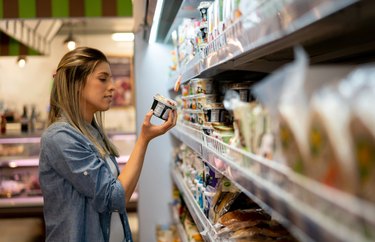
The ingredient list of your favorite foods may prove to be an impromptu chemistry class if you choose to see what you are putting in your body. Potassium benzoate may be one of those ingredients. According to the National Institutes of Health, it is also known as benzoic acid and potassium salt. Potassium benzoate is a salt of benzoic acid, as well as sodium benzoate, and calcium benzoate. The Food and Drug Administration has benzoic acid listed as GRAS, generally recognized as safe, which means it has been shown to be safe with its intended use.
What is Potassium Benzoate?
Video of the Day
Potassium benzoate is classified as a food preservative. It can work in one of two ways according to PubChem, a division of The National Center for Biotechnology Information. The first is as a food preservative, which means it inhibits or stops the process of fermentation, acidification, or any deterioration of a specific food. It is more specifically known as a fungistatic, which stops fungi's ability to grow or reproduce, which could potentially spoil a food.
Video of the Day
Foods Containing Potassium Benzoate
PubChem indicates that benzoic acid is a naturally occurring fungistatic in most berries, with cranberries containing a larger amount of natural benzoic acid. Research published in Frontiers in Microbiology indicate that benzoate salts are added to food products, beverages, cosmetics, and pharmaceuticals with ranges of 0.03 to 0.3 percent.
Potassium benzoate is used in carbonated drinks, such as waters and sodas, diet and regular. Sodium benzoate is more widely used than potassium benzoate. However, when sodium content needs to be reduced, potassium benzoate is usually the substitute.
Health Effects of Consuming Potassium Benzoate
One of the biggest concerns in the past regarding benzoate salts was in the potential for benzene in food and beverages. Often, when benzoate salts, such as potassium and sodium benzoate are added to foods, vitamin C is also added as a preservative. According to the FDA, foods and drinks containing benzoate salts and vitamin C that were exposed to heat and light were forming unusually high amounts of benzene. Benzene is a known carcinogen, which means it causes cancer.
According to the International Council of Beverages Associations, they are aware of the link between potassium and sodium benzoate salts and vitamin C forming benzene, and are taking steps to minimize the risk to the public. They state that the current minimal amount of benzene in beverages does not pose a public health risk.
The National Kidney Foundation indicates those with chronic kidney disease may not be able to maintain a proper level of potassium in the blood. For those watching their potassium intake, potassium benzoate could be adding a small, but significant amount of potassium to the diet. The Indian Health Service suggests that a 12 ounce can of diet soda can contribute 28 mg from potassium benzoate and a 16 ounce bottle of iced tea will add 60 mg of potassium from potassium benzoate and potassium sorbate.
Side Effects of Potassium Benzoate
PubChem does not indicate any side effects from consumption of potassium benzoate in foods, however, when exposed to potassium benzoate in isolation, it is classified as a skin and eye irritant.
If you experience any type of reaction after consuming a food with potassium benzoate listed in the ingredients list, it's possible you have an allergy or intolerance. Stop consuming that particular food and make an appointment with your primary healthcare provider to discuss your adverse reaction and possible causes.
Consuming products with potassium benzoate is a personal decision. Food manufacturers should list benzoate salts on the label, if it has been added during processing. If you choose not to consume potassium benzoate, reading ingredient labels is essential to see if it has been added to your food.
- Potassium Benzoate
- PubChem: Benzoic Acid
- Frontiers in Biology: Interactions between cranberries and fungi: the proposed function of organic acids in virulence suppression of fruit rot fungi
- FDA: Chemical Contaminants
- International Council of Beverages Associations: Benzene
- National Kidney Foundation: Potassium and your CKD Diet
- Indian Health Service: UPDATE ON NUTRITION FOR PEOPLE WITH CHRONIC KIDNEY DISEASE
- FDA: GRAS